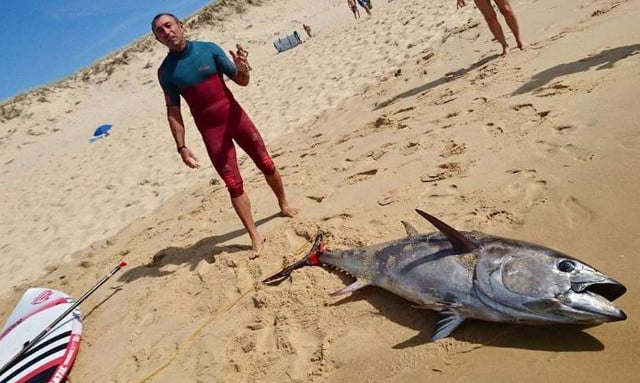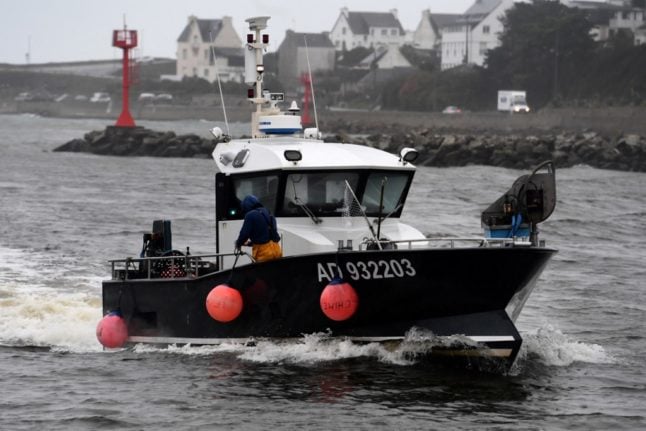
FISHING
Frenchman lassoes 2-metre tuna, surfs to shore
A surfer on France's Atlantic coast has a tale to tell to rival Hemingway's 'Old Man and the Sea.'
Published: 5 September 2017 17:14 CEST

Philippe de Lépervanche with the 2-metre-long tuna. Photo: Philippe de Lépervanche
As other surfers fled the water thinking the lurking two-metre-long creature was a shark, Philippe de Lépervanche quickly identified it as a tuna.
He leapt from his surfboard, lassoed it with his board’s leash and then flung his arms around it before finally using the waves to surf with the huge fish to the beach in Lacanau on France’s southwestern Atlantic coast.
“I used the waves to get into the shore,” Lépervanche told The Local. “It wasn’t easy! I had my arms around the fish, my paddle in one hand, and the surfboard was tied to my leg. It took me about 10 minutes to get in.”

Philippe de Lépervanche proudly holding his catch of the day. Photo: Philippe de Lépervanche
The sea at Lacanau, as on much of France’s Atlantic coast, is notorious for its strong currents, and on Monday a swimmer was drowned there.
Lépervanche, a keen amateur surfer, was out paddle boarding last Saturday in the popular surf resort where he lives when the fish was sighted.
“A couple of surfers shouted 'shark' and headed for the shore. I thought it might be somebody doing snorkelling. But I took a closer look and saw it was a tuna that was bleeding a little and looked as if it was wounded,” said the 50-year-old who runs a guest house in Lacanau.
His first attempt to get his board's leash around it failed, but when the tuna resurfaced a short time later he dived into the water and managed to get the rope around its tail.
Then began his epic battle to bring the catch to shore.
“He (the tuna) was injured but he was still strong and trying to escape,” he said.
By the time he got to the beach a crowd had gathered to cheer him on and admire his prowess.
The fish weighed 100 kilos and at two metres in length was bigger than the man who caught it.
Lépervanche and his friends then sliced up the catch and, after distributing tuna steaks to all present, froze what remained.
“As soon as the sun comes back we’re going to have a great barbecue,” he said.
Santiago, the ageing fisherman in Ernest Hemingway's 1952 novel “The Old Man and the Sea,” was unable to feast on his own catch of a 5.5-metre long marlin he hooked in the seas off Cuba.
By the time he finally managed to bring the giant fish to shore, after an epic struggle that lasted several days and involved strapping it to the side of his boat, its flesh had been stripped from its carcass by voracious sharks.
By Rory Mulholland
Url copied to clipboard!


 Please whitelist us to continue reading.
Please whitelist us to continue reading.